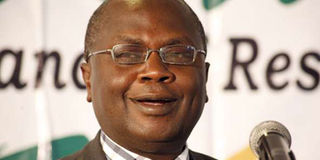Kenya gets Sh19.9bn World Bank grant to address school dropouts

Robert Masese, the director for secondary and tertiary education in the ministry of Education, at a past event. He has said the World Bank has given Kenya a Sh19.9 billion grant to address school dropouts. FILE PHOTO | PHOEBE OKALL | NATION MEDIA GROUP
What you need to know:
- The funds, will also be used to improve and develop infrastructure in schools, director of Secondary and Tertiary Education Robert Masese said on Thursday.
- Mr Masese said students drop out of school because of lack of school fees, lack or poor infrastructure, poor pedagogical skills by teachers, challenges affecting them at home among other reasons that they want to alleviate.
- Teachers Service Commission (TSC) officer Mercy Soko reminded principals to keep track of the performance contracting process online to gauge how they are performing and to adjust accordingly in areas where they are lagging.
The World Bank has given Kenya Sh19.9 billion grant to address the school dropout rate among learners in upper primary and secondary schools.
The funds will also be used to improve and develop infrastructure in schools, director of Secondary and Tertiary Education Robert Masese said on Thursday.
“World Bank has agreed to give us a grant of Sh19.9 billion to address poor retention of pupils in Standard Seven and Eight as well as secondary school,” said Mr Masese during a meeting with secondary school principals at the Travellers Beach Hotel in Mombasa.
Mr Masese said students drop out of school because of lack of school fees, lack of or poor infrastructure, teachers' poor pedagogical skills and challenges affecting them at home, among other reasons that they want to alleviate.
He said at the moment, they are drafting a concept note of the project plans to submit to the World Bank, after whiich the funds will be channelled to them.
He reiterated the government's plans to build 3,000 classrooms in secondary schools by 2017 to improve the transition of pupils from primary to secondary school.
He said 190,000 children are unable to join secondary school because of lack of space.
He urged principals to give their views on how best they think the World Bank funds can be utilised to ensure learners get quality education.
Meanwhile, in a presentation titled "School principals and financial management", acting director of school auditing Gordon Mweresa warned principals against mismanaging funds allocated to their schools.
“We are going to start conducting value for money audits to verify if the items, properties and services bought by an institution are actually benefitting the recipients or users,” said Mr Mweresa.
Teachers Service Commission (TSC) officer Mercy Soko reminded principals to keep track of the performance contracting process online to gauge how they are performing and to adjust accordingly in areas where they are lagging.
Ms Soko said the TSC is monitoring whether headteachers are using the funds in accordance to required rules and regulations, whether parents are being served properly and whether complaints are addressed, among other attributes.
She also advised them to ensure that they evaluate their teachers as per their teacher performance appraisals and submit their reports for first term by Wednesday on the TSC online platform.





